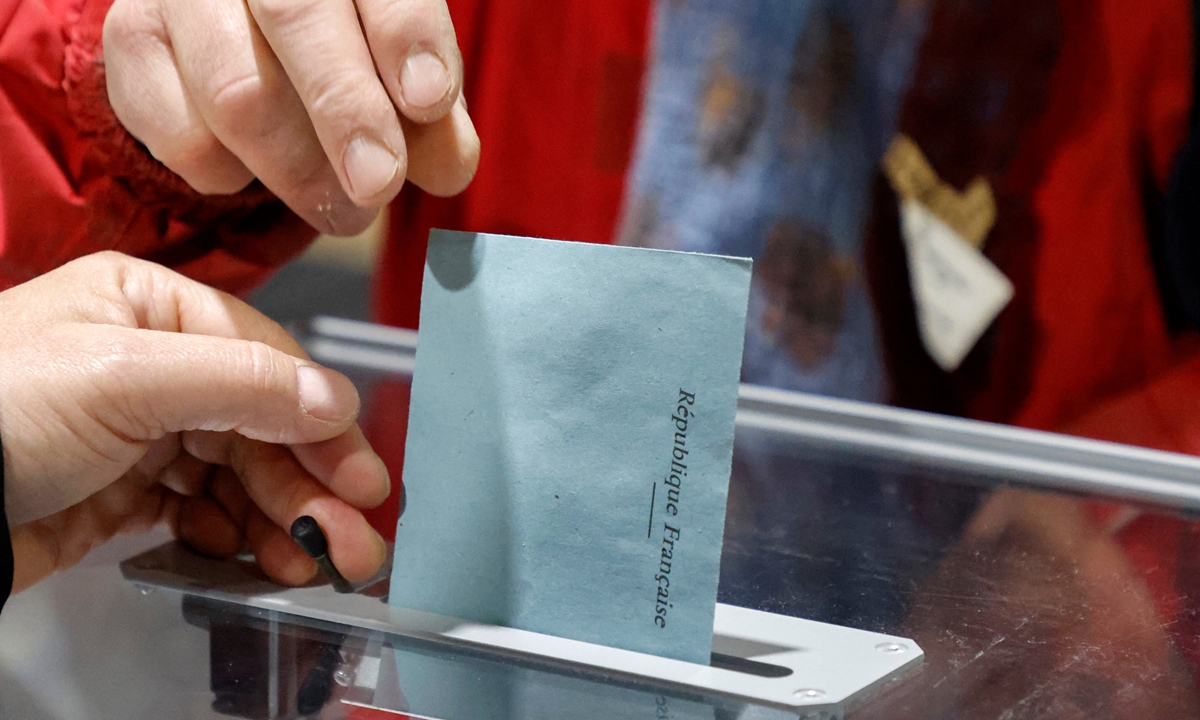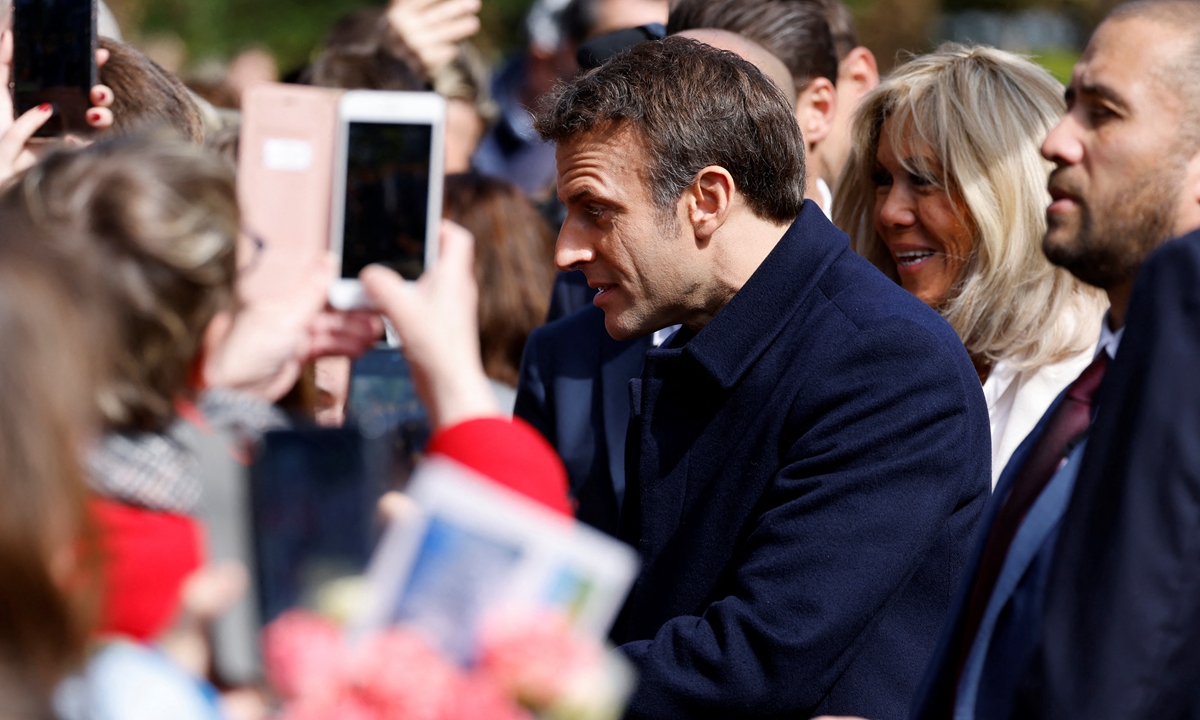
A voter casts their ballot for the first round of France's presidential election at a polling station in Le Touquet, northern France on April 10, 2022.

France's President Emmanuel Macron (center) and his wife Brigitte Macron (2nd from right) speak with onlookers ahead of casting their ballots for the first round of France's presidential election at a polling station in Le Touquet, northern France on April 10, 2022.
French voters headed to the polls to cast their vote in the first round of the presidential election on Sunday, which is expected to be a tight race between incumbent President Emmanuel Macron and far-right leader Marine Le Pen.
While some US media highlighted the Russia-Ukraine conflict as dominant issues for French voters, experts said that hyping relations between far-right groups with Russia will help Macron gain more support, but the Russia-Ukraine conflict will be a long-term issue of concern for European people, affecting the European political landscape in the future.
While Macron was still slightly ahead in the polls on Friday, his reelection no longer appears to be a foregone conclusion with Le Pen climbing in surveys, some of them putting her within the margin of error, Reuters reported on Sunday.
A poll on Friday showed the tightest gap ever, with Le Pen seen winning 49 percent of the votes in a likely runoff against Macron, her best polling on record, according to the report. Macron lost a further two points with 26 percent of support and Le Pen had gained two points to 25 percent.
Some 48.7 million people are eligible to vote in Sunday's presidential contest, choosing from a field of 12 candidates, according to media reports. It is Le Pen's third run for the Élysée Palace along with newcomers such as Eric Zemmour, a far-right former TV pundit.
"There won't be a cliff-hanger situation as the second round would be decisive, and there is almost no doubt about Macron's reelection," Zheng Ruolin, a research fellow at the China Institute of Fudan University, told the Global Times on Sunday.
The second round is scheduled on April 24 - a run-off between the top two candidates if no one achieves over 50 percent in the first vote.
Given the far-right's financial backers face many obstacles in France, Macron, who is supported by mainstream finance and backers as well as by mainstream media, still has the edge, Zheng said, noting that there has not been any scandal or incident that could disrupt this predictable outcome.
Cui Hongjian, director of the Department of European Studies at the China Institute of International Studies, echoed Zheng's view, saying the second round would be the key phase. "Historically, the far-right tends to do better in the first round, as it has quite stable support rate," Cui told the Global Times on Sunday.
Whether Macron leads the race depends on if he could pull together votes from the traditional left and right wings during the first round, experts said.
For Le Pen, if she would gain some votes diverted by her component Zemmour who is also in the far-right camp and votes from leftist candidate Jean-Luc Mélenchon, the second round might be a cliff-hanger, Cui said.
However, US media outlet Politico said on Sunday, "No matter who gets the most votes in France's presidential election, the winner will be [Russian President Vladimir] Putin." Politico said that Le Pen is literally on Moscow's payroll, and she said she admires Putin and Europe's economic crisis offers an opportunity to "turn our back to the US and turn toward Russia."
"In the context of the Russia-Ukraine conflict, voters are more conservative now, and I think that's one of the reasons why Le Pen is getting more support now," Cui said.
Le Pen went to the Kremlin to meet Putin during her last presidential campaign in 2017, the AP reported on Saturday, and "that potential embarrassment doesn't appear to have turned Le Pen's supporters against her," as she called Russia's military operation "absolutely indefensible" and Putin's behavior cannot be excused "in any way."
Amplifying the Russia-Ukraine conflict and hyping the stance of Le Pen is also a way of sending out warning shot to those who fund far-right candidates when the US-led cross-border financial capital is mainly standing behind Macron, Zheng said.
In the context of the Ukraine crisis, the Russia-EU disagreements are sure to become a backdrop for future political change in Europe, and even if the conflict stops, it may become a topic of concern for voters on European security, experts warned.
The EU has transformed into an economic branch of the North Atlantic Alliance (NATO), Russian Foreign Ministry spokeswoman Maria Zakharova said on Saturday, commenting on EU foreign policy chief Josep Borrell's remarks about a military solution to the Ukraine conflict, the TASS reported on Sunday.
During his visit to Kiev, Borrell said, for the first time in the history of the EU, that the conflict "will be won on the battlefield," but not through diplomatic efforts.
"In the past, security did not seem to be a major issue in the elections of most European countries, but in the future, it will be an issue, and to some extent, the stance on Russia policy may also become a topic of debates," Cui said.





